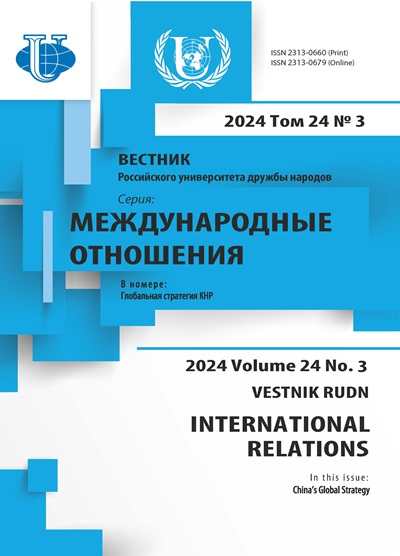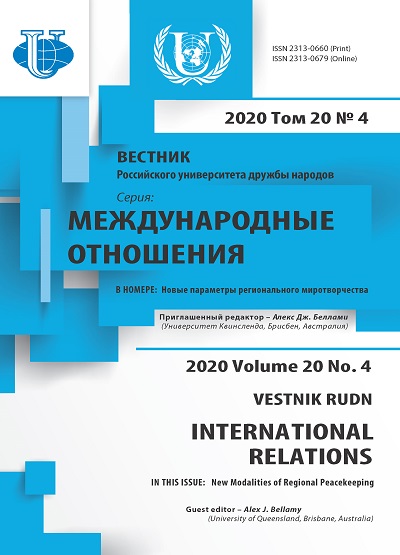Institutional Mechanisms of the Turkish Foreign Policy: The Case of Russia - Turkey High-Level Cooperation Council
- Authors: Aslanli K.1, Akgün B.1
-
Affiliations:
- Ankara Yildirim Beyazit University
- Issue: Vol 20, No 4 (2020): New Modalities of Regional Peacekeeping
- Pages: 791-804
- Section: BILATERIAL RELATIONS
- URL: https://journals.rudn.ru/international-relations/article/view/25283
- DOI: https://doi.org/10.22363/2313-0660-2020-20-4-791-804
Cite item
Full Text
Abstract
The article aims to examine and explore with pros and cons of High-Level (“Strategic”) Cooperation Councils (HLSCC) mechanisms in Turkish foreign policy and evaluate its effectiveness in foreign trade, foreign policy cooperation, and crisis management capacity of Turkey concerning the relations with Russia. Turkey has already started to establish High-Level Cooperation Councils to build institutional infrastructure for strategic partnerships in foreign policy and strengthen institutional power in the bilateral cooperation after 2006. The study of Turkish foreign policy is an academically attractive topic mostly in terms of its geopolitical dimensions. The institutional mechanisms that enable the country to interact with other states in a dynamic regional and international environment remain less researched heretofore. The article attempts to highlight the evolution of Turkish foreign policy in terms of institutional changes in the bilateral and multilateral mechanisms. The article applies a case study method with descriptive analysis examining Councils’ functions such as foreign policy coordination and determination of collective commitments and official bilateral targets in the case of Russia - Turkey High-Level Cooperation Council. The article found out that these institutional mechanisms partly justified themselves as a coordination mechanism, but they were relatively weak for achieving the pledged commitments. The Councils were flexible and innovative cooperation mechanisms of the foreign policy to develop bilateral and multilateral ties in the age of the global power restructuring and the volatile conjuncture in world politics.
About the authors
Kenan Aslanli
Ankara Yildirim Beyazit University
Email: kenan.aslanli@yahoo.com
PhD Candidate, Department of International Relations Ankara, the Republic of Turkey
Birol Akgün
Ankara Yildirim Beyazit University
Email: birolakgun@hotmail.com
PhD, Dr. of Sc. (Political Science), Professor, Department of International Relations Ankara, the Republic of Turkey
References
- Akgün, B. (2009). Türk Dış Politikası ve Uluslararası Örgütler. Akademik Orta Doğu, 3 (2), 1-40.
- Balcı, A. (2017). Türkiye Dış Politikası: İlkeler, Aktörler ve Uygulamalar. İstanbul: Alfa Yayıncılık. (In Turkish).
- Cavusoglu, M. (2017). Turkish Foreign Policy in a Time of Perpetual Turmoil. Insight Turkey, 19 (1), 11-16.
- Cem, I. (2004). Türkiye Avrupa Avrasya: Strateji, Yunanistan, Kıbrıs. İstanbul: İstanbul Bilgi Üniversitesi Yayınları. (In Turkish).
- Chitty, N., Ji, L., Rawnsley, G.D. & Hayden, C. (2017). The Routledge Handbook of Soft Power. London: Routledge.
- Dal, E.P. & Gok, G.O. (2014). Locating Turkey as “Rising Power” in the Changing International Order: An Introduction. Perceptions: Journal of International Affairs, 19 (4), 1-18.
- Eksi, M. (2016). The Rise and Fall of Soft Power in Turkish Foreign Policy During JDP. Riga: LAP Lambert Academic Publishing.
- Hale, W. (2012). Turkish Foreign Policy since 1774. London: Routledge.
- Karns, M.P., Mingst, K.A. & Stiles, K.W. (2015). International Organizations: The Politics and Processes of Global Governance. Boulder, Co: Lynne Rienner Publishers.
- Keyman, F. (2017). New Turkish Foreign Policy: Towards Proactive “Moral Realism”. Insight Turkey, 19 (1), 55-69.
- Kirişçi, K. (2009). The Transformation of Turkish Foreign Policy: The Rise of the Trading State. New Perspectives on Turkey, 40, 29-56. doi: 10.1017/S0896634600005203
- Kosebalaban, H. (2011). Turkish Foreign Policy: Islam, Nationalism, and Globalization. London: Palgrave Macmillan.
- Kuşku-Sönmez, E. (2018). Dynamics of Change in Turkish Foreign Policy: Evidence from High-Level Meetings of the JDP Government. Turkish Studies, 20 (3), 377-402. doi: 10.1080/14683849.2018.1495078
- Moravcsik, A. (1997). Taking Preferences Seriously: A Liberal Theory of International Politics. International Organization, 51 (4), 513-553. doi: 10.1162/002081897550447
- Nye, J. (2011). The Future of Power. New York: Public Affairs.
- Onish, Z. (2011). Multiple Faces of the “New” Turkish Foreign Policy: Underlying Dynamics and a Critique. Insight Turkey, 13 (1), 47-65.
- Safonkina, E. (2014). Turkey as a New Actor of Soft Power. International Organisations Research Journal, 9 (2), 145-166. (In Russian).
- Sazhin, V. & Karami, J. (2017). Iran-Russia Strategic Partnership at the New Stage: What Could We Propose to Each Other? Partnership between Russia and Iran: Current State and Development Prospects. Report of the Russian International Affairs Council, 29, 11-33. (In Russian). URL: https://russiancouncil.ru/common/ upload/RIAC-IRAS-Russia-Iran-Report29.pdf (дата обращения: 16.06.2020)
- Stein, A. (2008). Neo-liberal Institutionalism. In: Reus-Smit, C. & Snidal, D. (Eds.). Oxford Handbook on International Relations. New York: Oxford University Press. P. 201-221.
- Tugtan, M.A. (2016). Kültürel Değişkenlerin Dış Politikadaki Yeri: İsmail Cem ve Ahmet Davutoğlu. Uluslararası İlişkiler, 13 (49), 3-24. (In Turkish).
- Yeşiltaş, M. & Balcı, A. (2013). Dictionary of Turkish Foreign Policy in the AK Party Era: A Conceptual Map. Ankara: SAM Papers.
- Ataman, M. (2017). Editor’s Note. Insight Turkey, 19 (1), 4-8.











